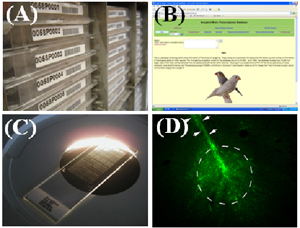WADA, KazuhiroProfessor
My research interest is to elucidate the molecular and genetic mechanisms underlying animal behaviors, especially learned vocal communication. Our laboratory has been studying the behavior of “songbirds (Passeriformes Oscines)”, which have a very unique “singing songs” behavioral pattern, as an animal model. Songbirds are known to learn species-specific songs in the early stage of their life, and the learning strategy varies among different species.
One of our research interests is to elucidate the evolution of vocal learning and vocal phenotype is accompanied by advantageous gene evolution at cis-regulatory elements in promoter regions that control species-specific regulation of genes.
We are also focusing on the singing-induced genes which were expressed at higher levels by singing in juveniles than adults, in song learning brain areas. Although the singing ability of songbirds is not dependent of their age (both the juveniles and adults can sing), they have a critical period of learning songs, which is also known in human language acquisition: the younger, the easier to master languages. Behavioral, developmental, and area-specific gene expressions should be regulated by various combinations of transcription factors via multi-cis-regulatory elements with epigenetic modifications, such as histone modifications and DNA methylation. Individual experiences and surrounding environments on their life should leave epigenetic codes on their genomic DNA, which are also ruled by the species-specific genome sequences, including species-specific regulatory elements for gene expressions. Thus, I believe that the study of the regulation of these promoters in songbirds will be significantly beneficial to elucidate molecular and genetic mechanisms underlying the critical periods for learning, individual behavior difference and species-specific behaviors.
Songbirds provide an ideal neuroethological model system. Their singing behavior can be easily observed, quantified, and described as shown above. The behavior is controlled by a discrete neural network, which causes production and learning of vocalizations, and has analogies to human speech. With these advantages, in-vivo gene manipulation techniques allow to investigate the functions of genes for developmental and species-specific behaviors using. Thus, the songbird will be a great candidate for future research in these areas to investigate at the level of individual animal behavior at molecular genetics level.
Songbirds also have the potential for studying human communication disorders, such as aphasia and stuttering. With the genomic information of the songbird, various studies using songbirds will be able to provide much more useful information in terms of utilizing songbird data for the elucidation of biological mechanisms of other organisms, including human
I always welcome ambitious young people (students) who want to be a professional scientist. With such young colleagues, I would like to do pioneering work which will lead to a new biological field “molecular genetic ethology,” as I have named it. If you have similar (not same) mind, join in our laboratory!
References
Wada K*, Howard JT, McConnell P, Whitney O, Lints T, Rivas MV, , Horita H, Patterson MA, White SA, Scharff C, Haesler S, Zhao S, Sakaguchi H, Hagiwara M, Shiraki T, Hirozane-Kishikawa T, Skene P, Hayashizaki Y, Carninci P, Jarvis ED*A molecular neuroethological approach for identifying and characterizing a cascade of behaviorally regulated genes.PNAS 103:15212-15217. 2006
Website
Wada Lab Behavioral Neurobiology, Dept. of Biological Sciences, Hokkaido Univercity
Faculty
Faculty of Science
Department of Biological Sciences
Behavioral Neurobiology
Grad School
Graduate School of Life Science
Division of Life Science
Biosystems Science Course
Contact Information
Faculty of Science, Building #5 5-910
Email: wada ![[atmark]](https://www2.sci.hokudai.ac.jp/dept/bio/wp/wp-content/themes/sci-bio_2407/img/atmark.png) sci.hokudai.ac.jp
sci.hokudai.ac.jp

